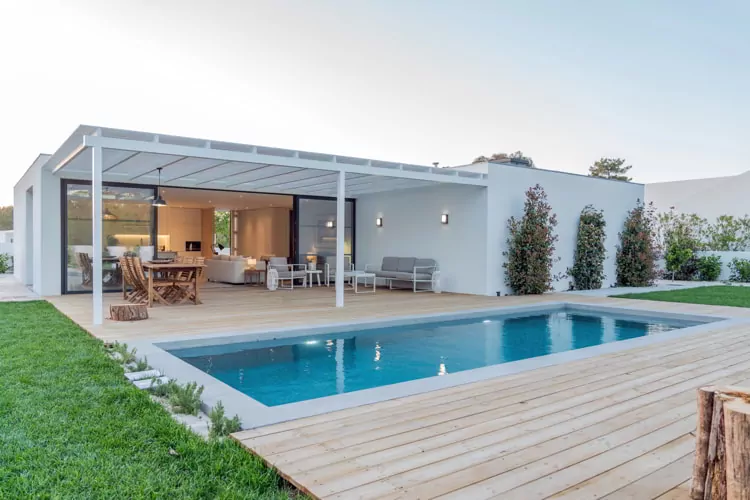They must have looked so alluring on paper…
Luxury villas next to the golf course at Quinta do Lago—one of the Algarve’s premier resorts… each with two full-size swimming pools (one on the rooftop) and a home cinema system and bar for entertaining guests…
Several years on since buyers paid seven-figure down payments, the unfinished villas at “The Keys” sit abandoned… scaffolding scattered about the grounds, stagnant rainwater filling up the swimming pools. The developers of this 72-property project went out of business after a local bank pulled its backing. Buyers are now battling to get their down payments (in the region of US$3 million) back, plus compensation.
The story made U.K. headlines—mainly because a number of its buyers were well-known British TV celebrities.
But, foreign property buyers get burned all the time…
We don’t all have millions of dollars to lose. But it hurts just as much when you lose a few thousand… or the clubhouse you depended on never gets built… or your dream home in paradise has no hot water (ever).
Buying a new property, pre-construction, always has an element of risk. But you can minimize your chances of getting burned by slowing down and taking the time to do your research.
Slowing down is key, in fact.
Speaking at our Global Property Summit a few years ago, developer Mike Cobb advised attendees to treat an overseas property purchase like a marriage.
“Did you meet your spouse and marry them all in one day?” Mike asked.
For most of us, that would be a resounding no.
The same level of caution we exercise during those first sparks of a romantic relationship needs to be applied to an overseas property purchase.
Sure, a property may give you goose bumps. That’s a good start. But no matter how good a deal, no matter how credible a developer, the decision to put your money (or borrowed money) on a piece of foreign real estate should not be made in a day.
Before you take the next step with your prospective new home or investment property, you need to ask certain questions—things that will signal whether or not this is a match for you…
Here are 10 questions to ask before buying property overseas:
1. Is there year-round access to the area in both the dry and rainy seasons?
This is especially important in Latin America. If you plan to live on your property only during the dry season, it may never be an issue. But, if you plan to rent your property—and the roads are impassable for months of the year—it will cost you.
2. Does the existing infrastructure include underground utilities, stormwater management, paved streets, and sidewalks?
I repeat, existing infrastructure. You don’t want to buy your property before these basics are in place. Again, in many parts of Latin America, it can rain 20 inches in 24 hours. Where does the water go? Ask to see the stormwater engineering plan.
3. Is there enough water and water pressure? A drip shower, anyone?
Not something you want to experience every day in your new home in paradise, right?
4. Is the home plumbed for water in all the bathrooms?
It’s not uncommon to walk into a luxury home overseas and find cold water running from both taps. We’ve heard of defensive developers saying that, in tropical climates, you don’t need hot water… or that cold showers are good for you. Would you accept that?
5. Will there be a community?
If what you’re looking at is a naked piece of land, could you survive if nobody else bought on the property? Sometimes, though you’ll pay more coming later to the table, it’s better to wait until some community exists. Also remember that the future value of your property is based on a community and amenities developing around it.
6. Is there a building requirement?
In planned communities, many investors buy the land to flip later… when all the amenities are in. Worst-case scenario, if nobody else ever broke ground, would you be happy living in paradise surrounded by empty lots?
7. Is there any kind of zoning?
You think you’re in a beautiful place… until your neighbor shows up and builds the house from hell. Not only that, but it gets in the way of your ocean view. It happens more often than you’d think.
8. How much are the HOA fees?
Outside of the United States, HOA fees are unregulated—they are whatever the developer says they are. Sometimes, developers will make them attractively low to bring buyers in… but be forced to raise them later to keep up with maintenance… or, even worse, neglect to maintain the common areas. Make sure the fees line up with what you think.
9. Is the development company financially sound?
When a developer tells you he’s going to build a clubhouse, a golf course, etc., ask him to show you where exactly that money is coming from (if in doubt, ask to see a bank statement). Often you’ll be told that the money will come from lot sales. Sometimes developers will take that money to buy more land without putting it into the promised amenities. Which leads us to the next point…
10. Does the company have a record of success?
How long has the developer been in business? Do they have a competent team? Track record is crucial here. Though no property purchase comes without risk, it can be minimized when you work with a competent team with a list of past successes.
Some of these questions may seem nitpicky. Or you may be afraid of getting on the wrong side of a developer. But, in overseas markets, developers expect these kinds of questions.
It’s how you protect yourself.
So don’t be shy. Be thorough.

